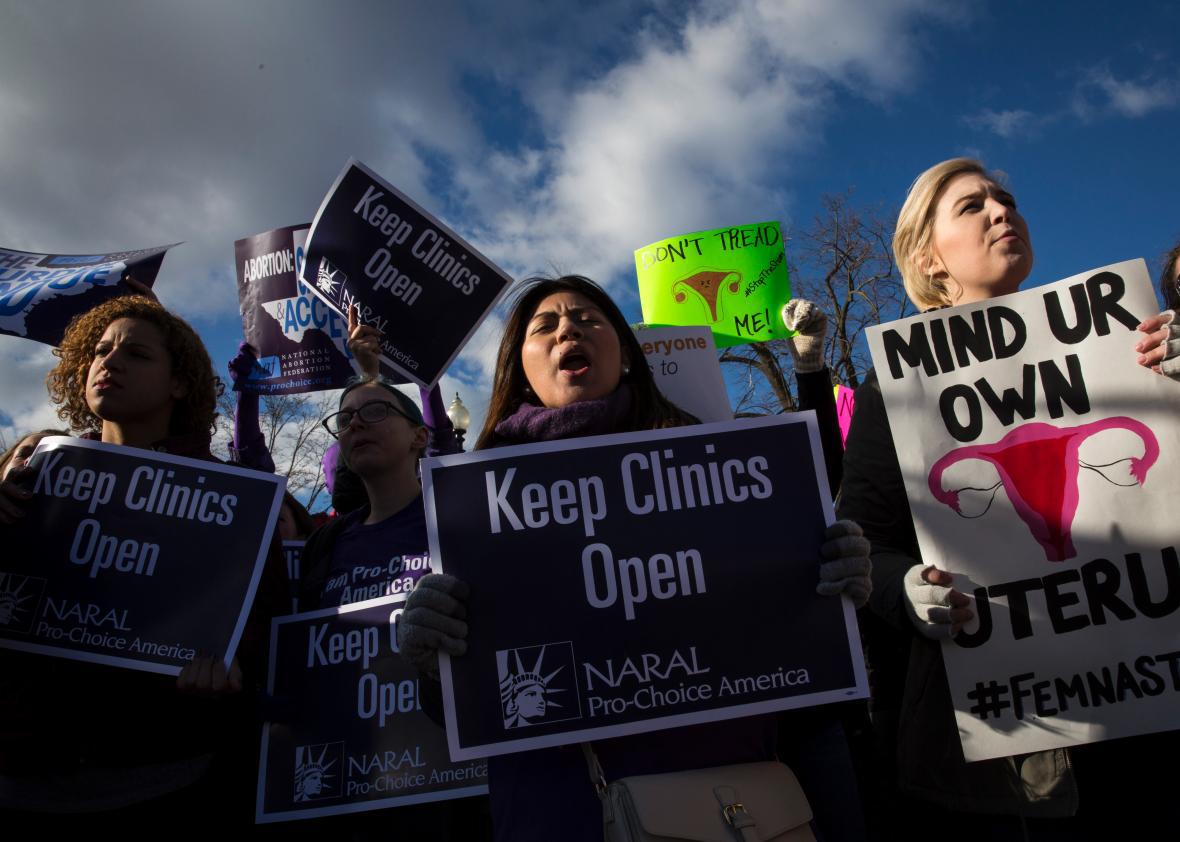A trio of reproductive-rights organizations is challenging state-level abortion regulations in Alaska, Missouri, and North Carolina, counting on the Supreme Court’s decision in Whole Woman’s Health v. Hellerstedt to back up their claim that these restrictions on abortion access serve no medical purpose.
The three new lawsuits, filed by Planned Parenthood, the American Civil Liberties Union, and the Center for Reproductive Rights, allege that the regulations rest on false claims of safeguarding women while they actually force women to travel long distances, often across state lines, to get constitutionally protected reproductive health care.
In a press call on Wednesday, Julie Rikelman, the Center for Reproductive Rights’ litigation director, called the litigation a “natural next step” after the Whole Woman’s Health decision. As the organizations prepare for the havoc Donald Trump’s administration promises to wreak on reproductive rights, Rikelman said, they are “going on the offensive” to defend abortion access.
In Alaska, a suit filed in state court is challenging longstanding regulations that effectively ban outpatient abortion procedures after the first trimester, requiring that second-trimester abortions be performed in hospitals. The laws on the books require an abortion provider to have an available blood supply and be staffed for major surgery, neither of which is necessary for any abortion procedure. These restrictions prevent regular clinics from providing abortions after the first trimester, and because of Alaska’s remote location, women who need an abortion later in their pregnancies must fly out of state to get the care they need. Similar hospitalization laws have been struck down or invalidated in other states.
The Missouri regulations that Planned Parenthood is seeking to overturn in federal court are nearly identical to the Texas restrictions the Supreme Court axed in Whole Woman’s Health v. Hellerstedt: laws that require abortion providers to gain admitting privileges at nearby hospitals and retrofit their facilities to meet the exacting standards of a surgical center. Missouri was the first state to pass these kinds of regulations, setting off a chain of anti-abortion activists in other states pushing similar laws under the guise of protecting women.
Justice Stephen Breyer’s opinion in Whole Woman’s Health specifically rejected these false premises for abortion restrictions, noting that Texas had “no significant health-related problem for [the restrictions] to cure,” since abortions are remarkably safe and the rare complication usually doesn’t arise until after the patient has gone home. Forcing women to travel long distances to precious few (and thus overburdened) facilities “would be harmful to, not supportive of, women’s health,” he wrote.
These and other medical restrictions targeted at abortion clinics have made Missouri’s reproductive health climate so hostile, there’s only one abortion provider left in the state. The new Missouri suit, filed in federal court, alleges that there are four additional Planned Parenthood health centers in the state that currently only provide contraceptive and other health services but would readily offer abortion care if the challenged regulations were lifted.
The third lawsuit announced today, filed in federal court, targets a North Carolina law that bans abortions after 20 weeks’ gestation, about a month before the viability threshold established in Roe v. Wade. Earlier this year, that law was amended with a very narrow exception for a medical emergency, meaning that a physician who would perform an abortion to safeguard the health of the pregnant patient would have to wait until her medical condition worsened to a particular point of severity before providing a necessary abortion.
Jennifer Dalven, director of the ACLU’s Reproductive Freedom Project, said these lawsuits are just “the first wave” of litigation the organizations are preparing to bring to expand and protect abortion access at the state level.
